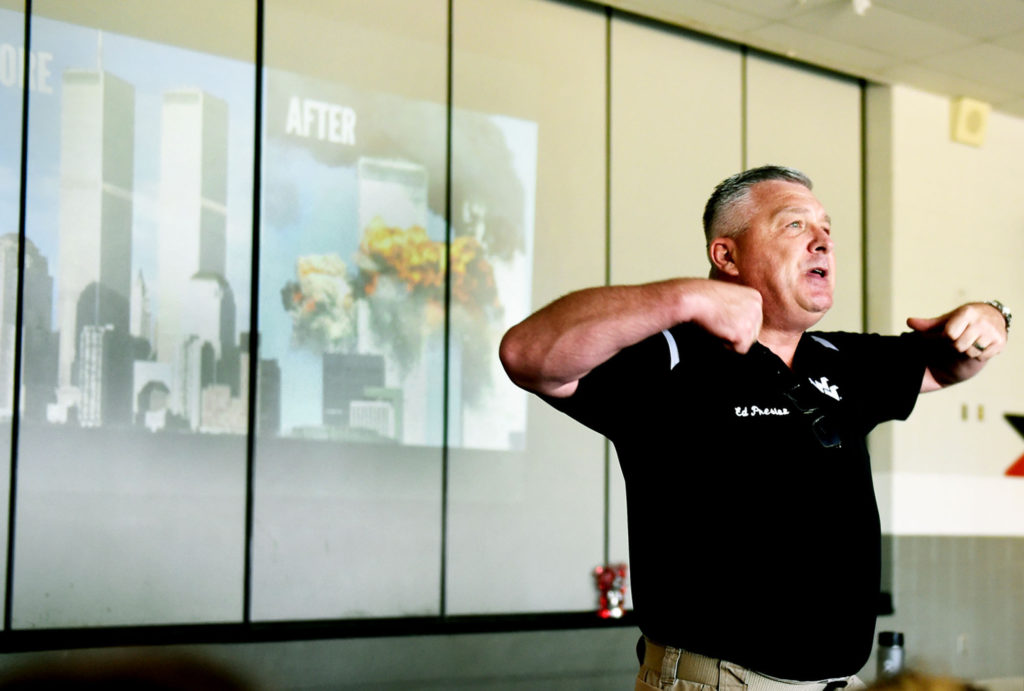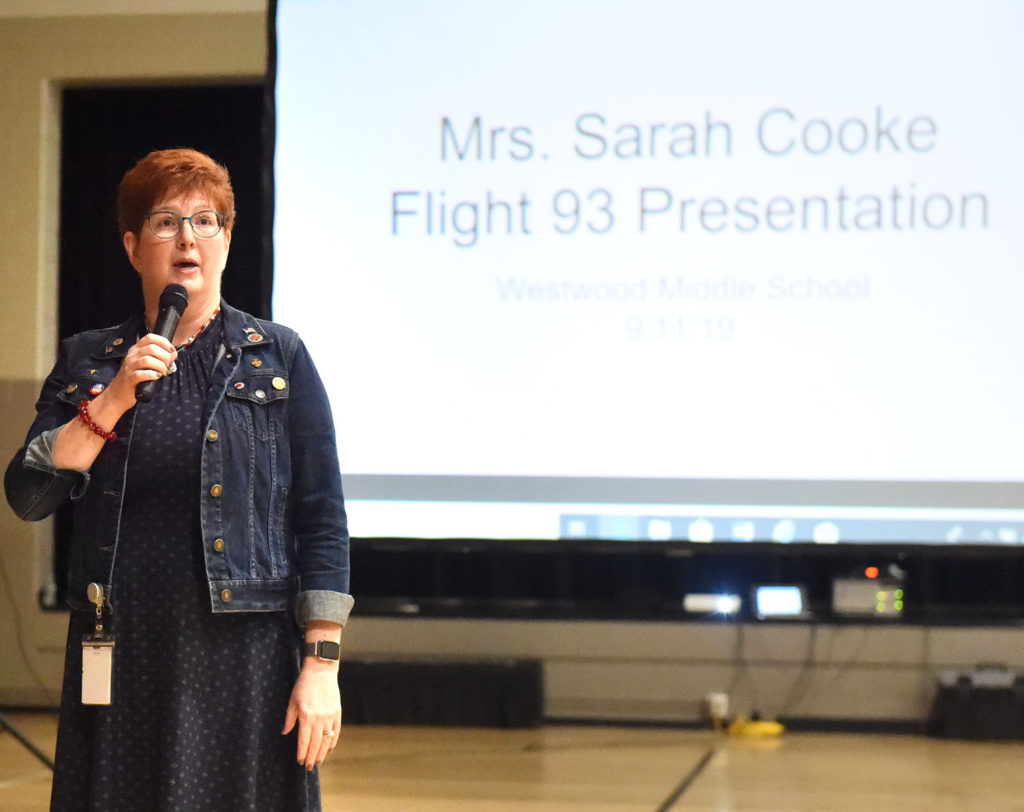MORGANTOWN, W.Va. — Sarah Cooke blinked twice to shake off the glare of the klieg lights, and when she looked back down, it was still there. Something shiny. Well, that one little notch, anyway.
It was the glint that made her look twice. The object was small and round, and even though it was blackened by fire, it was still familiar-looking.
“I think I know what that is,” she said. She scooped it up with her gloved hand, and she was right. Just as she thought, it was the back cover of a man’s wristwatch, and it carried some engraving she could still make out: “SD to JD 9-14-86.”
Ed Preston didn’t want to see what he was seeing, even as he couldn’t stop looking up. “Is that a person? That’s a person.”
Whoever it was crawled around to the outer edge of the broken window — and let go. Flailing arms, tumbling end over end, to eternity. It took forever. It didn’t take any time at all.
Collective memory
Wednesday marked the 18th anniversary of Sept. 11, the day terror called on America. For a trio of social studies teachers at Westwood Middle School, the observance also made for an intellectual challenge.
How do you make students “remember” something that happened before they were even born? Well, said teacher Phil Caskey, who teamed up with his fellow Westwood educators Barbara Smith and Ashley Grandick-Peck, you could offer a living history for the day, from the people who were there.
“It’s our privilege and duty to tell the Sept. 11 story,” Caskey said.
That’s why they interspersed all those factoids on Middle East history and American foreign policy into the daily lesson plan leading up to the observance. On Wednesday, the teachers stepped back to let two people who were there tell the story.
Sarah Cooke, who is now a secretary at Westwood, has a medical background. She was a first responder who used to work with medical flight crews in the Pittsburgh area. Ed Preston joined the U.S. Marines and served in Desert Storm and Desert Shield on his way to becoming Morgantown’s police chief. After his military hitch, he worked with federal authorities as an undercover officer on a variety of drug and racketeering cases.
‘And we are at war’
Cooke was actually training in Morgantown on the morning of Sept. 11, 2001. The sky was cloudless and lithograph-blue, the air carried the tang of autumn and people were scurrying around looking for televisions. As it turned out, that was so they could watch the endless loops of two passenger planes crashing into the double towers of the World Trade Center in Manhattan.
When it became clear that it wasn’t an accident, and that there was still another hijacked plane with people in the air — United Flight 93 — she and her crew were scrambled.
“We just knew we were going somewhere,” she said.
The responders had three minutes to stow their equipment, get into their gear and make one phone call. Cooke called her mother, who answered with a tense haiku, reflecting an America forever changed.
“She said, ‘Hi, baby. I love you. And we are at war.’ ”
‘Where are you?’
The cellphones of 2001 could be spotty on a good day, and the only call Preston would receive on Sept. 11 was a frantic one from home. Preston was in the city to testify as part of a federal drug prosecution. His phone chirped. His wife.
“Where are you?”
“I’m in a cab.”
“Yeah, but where are you?”
By then, he could see the smoke from the first tower.
Making their decision
Preston, out of the cab, instinctively jerked his head up at the sound of the second plane.
When he saw the belly of the second airliner seemingly do a fiery dissolve into the chrome and glass of the second tower, he knew neither was an accident.

Preston was running for cover, but always an officer, he and others who wear the badge were also trying to huddle panicked school children, who were looking for their parents in the tumult.
He looked up to see people in a world of hurt — 1,600 feet above the sidewalk.
“It was like they were saying, ‘Do I burn up in the building, or do I just jump?’ You could only watch as they made their decision.”
Eventually, both towers came down, the same exact way they went up during their construction in the early 1970s.
One story at a time.
And when one of those 110 stories would collapse onto its partner below, a large-scale explosion would burst from the sides.
Firemen were being pummeled to death by pieces of what used to be buildings as the towers gave up their structural ghost.
Cruel juxtaposition

Cooke, meanwhile, was struck by the contrast in Somerset County, Pa.
A beautiful forest was at the edge of an angry crater.
An angry crater is what you get, she said, when a 757 passenger plane, fully loaded with fuel for a West Coast flight, augers into the Earth upside down at more than 500 miles an hour.
What was left, wasn’t much.
And what they found was both grim and poignant. Bone fragments. Teeth. That watch cover. And, curiously, seatbelts that were unbuckled.
Flight 93 was believed to have been on a suicide course to the U.S. Capitol Rotunda or the White House. Those seatbelts were why the plane never made it.
Terrible bravery
Preston will forever be in awe of the firemen who rushed into the towers while people were running out.
Cooke still has a catch in her voice when she talks about those unbuckled belts.
Passengers weren’t in their seats because they were rushing the cockpit to try to take back the plane.
They went from flying coach, she and Preston said, to being citizen-soldiers.
“That’s bravery,” said the police chief, who was finally able to call his wife back the following day, via something else that would be a history lesson for the students of Westwood Middle.
“I used a payphone,” he said. “Thirty-five cents to call home.”
And Cooke was able to give that watch cover back to “SD” — Sandy Dahl, the wife of Jason Dahl, Flight 93’s captain. The watch was a gift to her husband on their wedding day of Sept. 14, 1986.
Cooke would have no way of knowing she was talking to another fatality of Sept. 11. Sandy Dahl died of an accidental drug and alcohol overdose in 2012, having never gotten over the trauma of her husband’s death.




